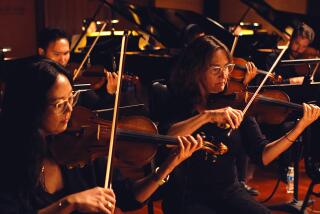Pioneer of Classical Music for Kids
- Share via
As a classical music lover since I was a boy, I am delighted to learn that a series of videotape and CD lines are being produced to make the classics as much a part of the daily lives of children as rock music (“Making Classical Music Kid’s Stuff,” Calendar, Nov. 2). However, I must point out that the current producers of classical music for kids, deserving of praise as they may be, are far from the first with this idea. Nor was Leonard Bernstein the first on the block to make the classics user-friendly with his well-remembered “Young People’s Concerts” in the 1950s and ‘60s.
The very first record album to make classical music fun for kids was “Rusty in Orchestraville,” produced by former bandleader Alan W. Livingston for Capitol Records in the fall of 1946. Although I now have “Rusty” on tape, I well remember playing my copy of the original 78 r.p.m. album many times in the late 1950s. It was so wildly successful--over a million copies sold--that Livingston followed it with “Sparky’s Magic Piano” in 1948.
My favorite of the two remains “Rusty,” which established a standard that is still worth emulating today. What was there about “Rusty in Orchestraville” that captured the imaginations of us baby boomers? Like “Peter and the Wolf,” it told a story designed to introduce kids to musical instruments, but in a way that personalized them.
Rusty (Henry Blair) is a boy “about your age” who hates his piano lessons because he has to play scales endlessly instead of cutting loose with a real piece of music. Falling asleep after his hated lesson one day, he dreams he is in Orchestraville, where all the instruments live. The basso-voiced conductor of Orchestraville (Billy Bletcher) takes him on a guided tour of the place, introducing him to Vera the Violin, Tommy the Trumpet, Bobo the Oboe, Sammy the Saxophone and so on.
Each plays an excerpt from such works as “The Swan” (Saint-Saens), “The Carnival of Venice,” and “Nocturne in E Flat” (Chopin). The entire orchestra plays the “Surprise” segment from Hayden’s “Surprise” Symphony after the conductor tells Rusty the short story behind it. When Rusty finally apologizes to Peter the Piano for making a disparaging remark about him, Peter obliges with all of Chopin’s “Minute Waltz.”
*
What makes all of this such a delight is that the instruments talk to Rusty via Sonovox, a unique mechanical device. It is held to the larynx so that wordless speaking becomes a pleasantly weird synthesized voice. (The voice of Casey Jr. in Disney’s “Dumbo” is someone using Sonovox.) The punch line is that after getting to know several of the instruments personally, Rusty is now motivated to work at his piano lessons so he can have the fun in real life that he had in Orchestraville. The couched-in-entertainment lesson: You can’t get there without a lot of practice.
In addition to his classical music duo, Livingston also created Bozo the Clown, producing numerous Bozo albums starring Pinto Colvig--the original Bozo and the voice of Goofy--from 1946 to the mid-1950s. Remember “Bozo at the Circus,” “Bozo and His Rocket Ship” and so on?
And Livingston created record lines for kids starring Woody Woodpecker and the Warner Bros.’ characters. Many of these albums were known as record readers because their comic strip-type pages helped children learn to read while enjoying the stories. Sound familiar?
They also made happily creative use of outrageously comical musical sounds and noises and featured an array of talented voice people such as Mel Blanc, June Foray and Billy Bletcher. Billy May wrote the original music, including the Bozo theme song, for which Livingston wrote the lyrics.
My reason for writing this is to cure a bit of cultural amnesia. A new generation of people who want to share their love of the classics with children are making it fun again. But a gifted young music man named Alan Livingston--who today heads an animation company called Pacific Rim Entertainment--first paved the way nearly 50 years ago.
More to Read
Sign up for The Wild
We’ll help you find the best places to hike, bike and run, as well as the perfect silent spots for meditation and yoga.
You may occasionally receive promotional content from the Los Angeles Times.






